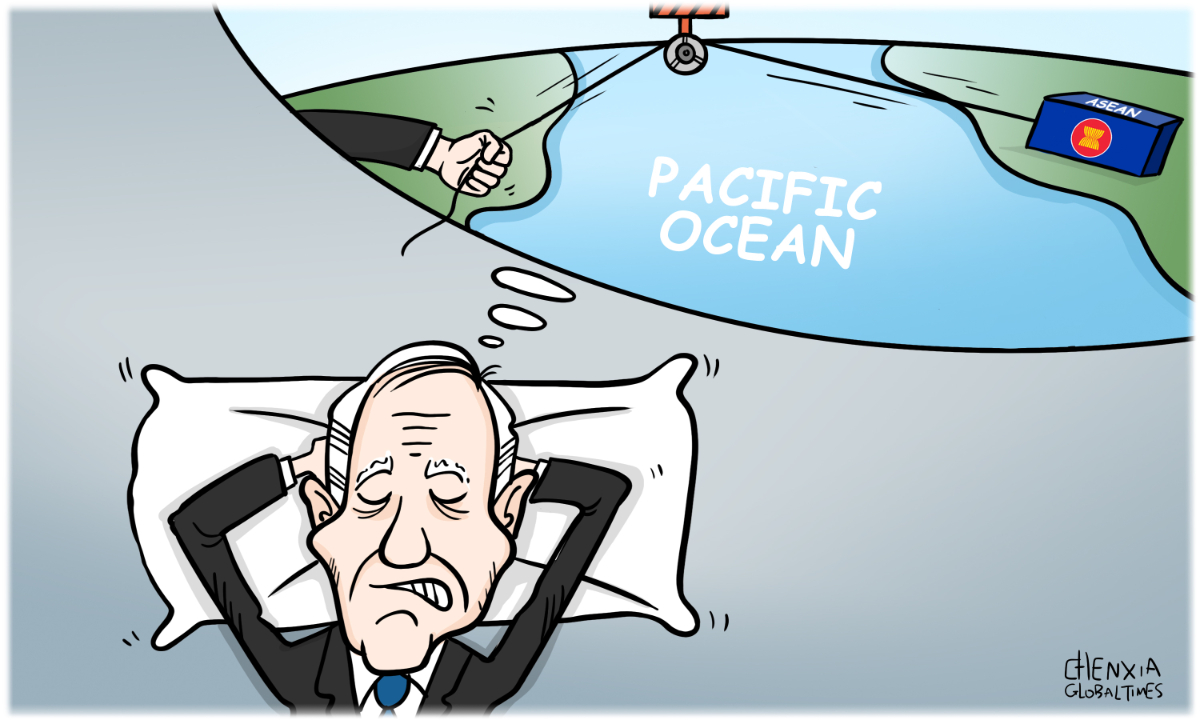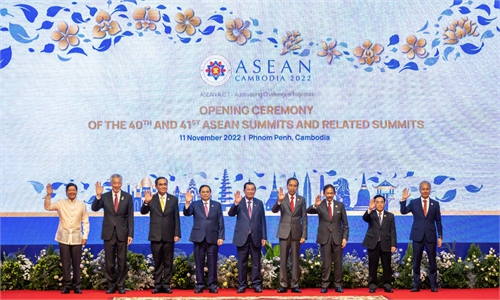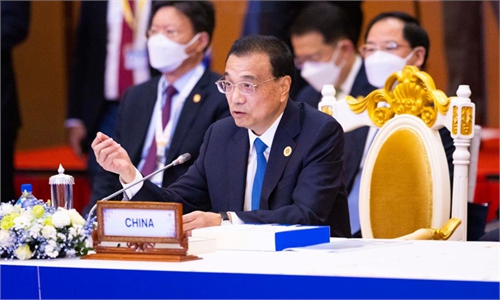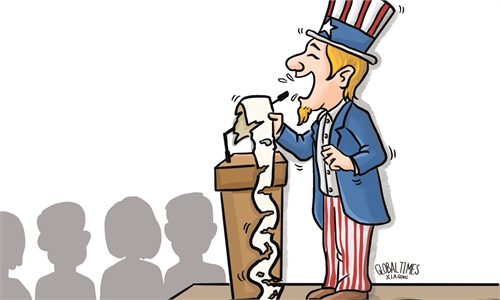
Illustration: Chen Xia/Global Times
US President Joe Biden, during his meeting with leaders from Association of Southeast Asian Nations (ASEAN) members, spared no effort wooing these countries, including elevating ties with the bloc to a comprehensive strategic partnership and promising a budget request for $850 million in assistance to regional countries.
But observers said these were just "symbolic" moves and that the budget was a mere "drop in the bucket."
Biden seeking closer ties with the ASEAN harbors an obvious agenda to lure these countries to stand at the frontline of confronting China, yet such agenda is what these countries are trying to shun away from in their cooperation with Washington, said experts.
They warned that US' pushing such agenda risks prompting the ASEAN members to distance themselves from the US. Moreover, US' reliability and credibility are also under test among regional countries - its ties with this bloc were frayed under Biden's predecessor and ASEAN members also aren't sure whether US domestic uncertainty will deal another blow to bilateral ties.
In remarks at US-ASEAN summit in Cambodia on Saturday, Biden said a Comprehensive Strategic Partnership between the US and the bloc will help to tackle "the biggest issues of our time."
Despite claiming ASEAN as the heart of his administration's "Indo-Pacific Strategy," Biden slipped up at the summit, referring to Cambodia, which is hosting an international summit led by Southeast Asian leaders, as Colombia.
"This [the elevation of ties] looks more like a symbolic act. The US is playing the catch-up game with China," Koh King Kee, president of Center for New Inclusive Asia, a nongovernmental Malaysian think tank, told the Global Times on Sunday. He said China and ASEAN already established in 2021 a strategic partnership, which is a more concrete one.
The US used to cultivate bilateral ties with Southeast Asian countries, the upgrade of ties with the whole bloc and doubling down on ASEAN centrality revealed that Washington now wishes the whole bloc could play a central role, to counter what the US believed is China's rising influence in this region, Chen Xiangmiao, an assistant research fellow at the National Institute for South China Sea Studies, told the Global Times on Sunday.
In a move to further woo these Southeast Asian countries, Biden promised a budget of $850 million in assistance for regional countries. He said it would pay for more Southeast Asian projects such as an integrated electric vehicle ecosystem and clean-energy infrastructure to reduce carbon emissions.
Chen described the package as a "drop in the bucket," as the money is diminished after it's doled out to each member of the 10-country bloc; and clean projects such as integrated electric vehicle ecosystem require support of the whole industry, which is lacking in many Southeast Asian countries. "Will the US have enough money to support the follow-up investment?" asked Chen. He mocked the assistance as Washington's "promising the moon."
Biden has announced a $150 million development and security package for ASEAN at the US-ASEAN Special Summit 2022 held in May, which paled vis-a-vis the $1.5 billion development assistance China pledged to the ASEAN members in November 2021 to fuel economic recovery and fight the COVID-19 pandemic.
Chinese Premier Li Keqiang on Friday attended the 25th China-ASEAN Summit, during which he called for enhancing cooperation with ASEAN members, and jointly maintaining regional peace and stability, the Xinhua News Agency reported on Saturday.
Li said that China and ASEAN are comprehensive strategic partners with a shared future, and have stood together through thick and thin. "Taking sides should not have to be our choice. Openness and cooperation are the viable way in meeting our common challenges."
The fundamental difference between China's and US' cooperation with ASEAN is that China's goal is to achieve a truly prosperous and peaceful ASEAN. In addition, China doesn't interfere in ASEAN members' internal affairs.
In contrast, US' ASEAN policies, when emphasizing the bloc's centrality, are actually centered around itself, as Washington only wants the bloc to serve as its pawn to counter China, and to fulfill its own hegemony goal, said Chen.
"China's presence in Southeast Asia is basically economic, China and ASEAN economies have greater economic complementarities. For the US, its interest in ASEAN is geopolitical rather than economics," said Koh.
The value of Chinese-ASEAN trade soared 28 percent to $878 billion in 2021. That's almost double the $441 billion in total trade between the US and the ASEAN bloc last year.
A flip-flop US
Even though Biden has made a flurry of rosy promises to the ASEAN members, the US policies in this region are still under test as improving US-ASEAN trade ties were stunted by former president Donald Trump's move to exit the Trans-Pacific Partnership regional trade grouping in 2017, and he only made one brief appearance at an ASEAN meeting - in 2017, the year he took office.
Across the region, there's deepening skepticism about whether the 2024 election might bring in a president who doesn't want to follow Biden's lead, Scot Marciel, a former principal deputy assistant secretary for East Asia and the Pacific at the US State Department, told US media Politico recently.
CNN projected on Sunday that Democrats will keep their narrow Senate majority for the next two years while Republicans were widely expected to win a majority of the House.
Chen believes that no matter which party wins the US election in two years, as long as Washington still sees Beijing as its nemesis, it will continue to woo ASEAN and try to elbow the bloc to the frontline of countering China in the region.
"However, a Republican president may seek to curtail the US economic cooperation and assistance to this region, similar to what Trump did during his tenure," said Chen. He noted such a move may again fray US relation with the bloc.
Chen warned that fixating on standing up against China in the region will only alienate the bloc away from Washington as this region has repeatedly voiced that it does not want to be caught in the middle of Beijing-Washington rivalry.



